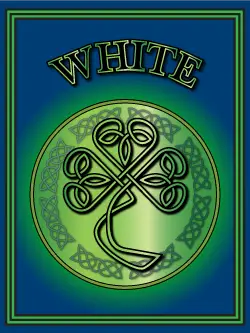The surname White is a popular one in several countries around the world.
The name evolved independently in France, Scotland and England. Over time the various versions of the name all found their way to Ireland and they merged together as one.
White is now among the 50 most common names in Ireland.
The English version of the name was given to someone of a pale complexion. There were also people in England called Wight after they had travelled from the Isle of Wight.
The name Wight was easily confused with White, and ultimately had its spelling changed and became the same name.
Anglo-Norman Whites
The French name Blanc also referred to someone’s physical appearance. It was brought to England when the Normans invaded in the 11th century.
As the Normans integrated with the English the ‘Blancs’ became known as the ‘Whytes’.
In the following centuries, the Anglo-Normans crossed the Irish Sea to invade on several occasions and the name also became common in Ireland.
Many of the Normans settled in Ireland and set up alliances with powerful Gaelic families. Both the Norman Whyte and the English White became common in Ireland.
In some cases, the name was translated into the Gaelic word for white, faoite. MacFaoite became a family name meaning the descendants of White.
The Anglo-Norman Whites were particularly numerous in southern Ireland, in Counties Limerick and Waterford.
Scottish Celts brought their version to the north
Meanwhile, a similar name had evolved in Scotland. Mac Gille Bhain was the name of a Celtic family. The name was made up of Highland Gaelic words, ‘bhain’ meaning youth and ‘gille’ meaning fair.
This would have been a description for a young man with lighter hair and a pale complexion. The Mac prefix meant the same as in Ireland, ‘the descendant of’.
The Scottish Celts travelled and settled in the north of Ireland on a number of occasions over the years. At some point, they brought with them their own version of the name White.
All the versions merged into one
Most versions of the name were changed back to the English sounding White after the 17th century.
Oliver Cromwell’s invasion of Ireland signalled the start of a period of anglicisation of the country.
Irish land was given to British settlers and it was much easier for people to get work if they had an English name. Therefore, MacFaoite was changed back to the English White by most people.
Written records of people’s names were also taken for taxation purposes, and these were written by English clerks who wrote the names as they interpreted them. In this period, almost all the variations of the name merged into White.
The name travelled to America, Australia and Canada when millions of Irish people had to leave their homeland because of the ‘Great Famine’ in the mid-19th century.
There have since been hundreds of noteworthy people named White in a variety of fields.
Musical Whites
Alan White was the drummer of English rock band Oasis during their most successful period, from 1995 to 2004.

Barry White was a legend of soul music, renowned for his deep voice. Many of his hits are still played regularly today.
Jack White is the lead singer and songwriter of American band The White Stripes. The band’s drummer Meg White is his ex-wife.
Vince White was a guitarist in English punk-rock band The Clash.
Verdine White is the bass player for American band Earth, Wind and Fire.
Whites of film and television
Betty White is a veteran actor and television personality. She has appeared in countless shows throughout her career, most famously as Rose Nylund in The Golden Girls.
She is in the Guinness Book of Records for having the longest career in television entertainment for a female performer and had a star on the Hollywood Walk of Fame.
Slappy White was a star of the comedy and stand-up scene in America in the 1950s and 60s. He also appeared in several comedies later on in his career such as Blossom and Cybil.
There have also been hundreds more Whites who have made a mark in sports, politics and literature.
